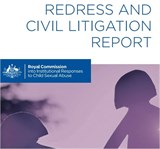Child abuse claims - no more limitation period in NSW - Between the Lines April 2016
Child abuse claims - no more limitation period in NSW
Summary
The Limitation Act 1969 has been amended from 17 March 2016 by the insertion of s 6A, that has the effect of removing limitation periods for personal claims that relate to "child abuse".
Previously personal injury claims arising from child abuse were treated like any other personal injury claim; i.e. were subject to a fixed limitation period. Plaintiffs seeking to bring a latent child abuse claim often relied on s 52 Limitation Act , whereby the limitation period was suspended for the duration of any disability. Broadly, plaintiffs needed to prove (with psychiatric evidence) that they had a mental disability covering the years between the abuse and the bringing of the claim.
History
We are not surprised by the amendment of the Limitation Act.
Limitation periods were abolished in Victoria1 and the NSW Government released a discussion paper contemplating abolishing limitation periods for child sexual abuse cases in January 20152.
The Royal Commission into Institutional Responses to Child Sexual Abuse commenced in 2013. Among the recommendations in its August 2015 Redress and Civil Litigation Report3 were removal of limitation periods for child abuse claims "with retrospective effect ... as soon as possible" (p 459).

The Royal Commission's Redress and Civil Litigation Report, published in August 2015
How the changes work
Section 6A now provides at (1) that "[a]n action for damages that relates to the death of or personal injury to a person resulting from an act or omission that constitutes child abuse of the person may be brought at any time and is not subject to any limitation period". "Child abuse" includes sexual abuse, serious physical abuse or "connected abuse" while the victim was under 18 years of age.
Section 6A applies to claims brought by the estate or relatives of deceased victims; ss (5). The Court retains power to "summarily dismiss or permanently stay proceedings where the lapse of time has a burdensome effect on the defendant that is so serious that a fair trial is not possible"; Note to s 6A.
Section 6A applies to any claim where the injury results from child abuse. That includes claims against institutions based on negligent supervision or vicarious liability. The transitional provisions at Schedule 5 state that 6A applies whether or not proceedings have been commenced and whether or not a Court has previously given judgment on a limitation issue. Accordingly s 6A will apply to future cases (concerning past abuse), cases pending in the courts and cases previously dismissed for being statute-barred.
Conclusion
Our experience is that plaintiffs seek to suspend the limitation period by bringing evidence of a disability. That was challenging and arguably impossible in hindsight, as plaintiffs needed medical evidence certifying a continuous mental disability over many years in the past. These changes remove one more barrier to victims seeking redress by damages actions.
For more information contact:

Patrick Thompson
Principal
D: +612 8289 5920

Patrick Riordan
Senior Associate
D: +612 8289 5921
1Limitation of Actions Amendment (Child Abuse) Act 2015 (Vic)
2 Available at
http://www.justice.nsw.gov.au/justicepolicy/Documents/Discussion%20paper%20on%20amendments%20to%20Limitations%20Act%201969.pdf
3 Available at
http://www.childabuseroyalcommission.gov.au/getattachment/0d8ecf95-ba08-47a6-8e29-5d26a0a83eca/Redress-and-Civil-Litigation-Report



